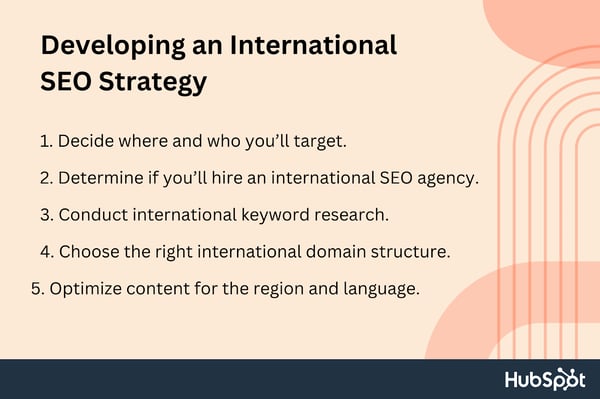Navigating the Digital Landscape: Leveraging International Search Engine Optimization for Cross-Border Success
In today's interconnected digital world, services are progressively looking beyond borders to take advantage of worldwide markets. Leveraging seo (SEARCH ENGINE OPTIMIZATION) strategies tailored for worldwide audiences is critical for achieving cross-border success. The complexity of navigating the digital landscape on a worldwide scale demands a nuanced method, from comprehending the principles of International SEO to executing geotargeting and multilingual key words techniques. As business aim to broaden their reach and exposure across different territories, optimizing website structures and keeping track of cross-border performance become indispensable parts of an effective global SEO technique.
Understanding International Search Engine Optimization Fundamentals
Browsing the details of worldwide SEO requires a strong grasp of essential principles to effectively increase on the internet visibility throughout borders. One crucial facet of worldwide SEO is recognizing the significance of localization. This involves customizing site web content to fit the linguistic, social, and industrial distinctions of target markets. Keywords need to be not only equated but likewise adjusted to reflect just how users in various regions look for information.
Furthermore, having a clear understanding of geo-targeting is essential. This includes showing to internet search engine the certain nations or regions a site is targeting. Applying hreflang tags is one means to communicate this info, ensuring that the appropriate variation of a web page shows up in the search results for an individual in a certain area.
Additionally, comprehending the effect of neighborhood search engines and social media platforms is crucial for global search engine optimization success. While Google is leading in lots of areas, countries like China have their own search engines like Baidu, calling for tailored methods for each system to make best use of on the internet presence (International SEO).

Targeting Multilingual Keyword Strategies
Creating multilingual search phrase methods is essential for successfully getting to diverse worldwide target markets and optimizing online exposure throughout various linguistic regions. When targeting multilingual search phrase techniques, it is vital to conduct complete study to understand the certain search terms and expressions made use of by the target audience in each linguistic area. This entails not just translating key phrases yet also thinking about social subtleties, regional dialects, and search patterns one-of-a-kind to each target market.
To develop an effective multilingual keyword phrase approach, it is necessary to prioritize importance and search intent. Search phrases should align with the content on the site and resonate with the cultural context of the target market. Using devices such as Google Key Words Coordinator, SEMrush, or Ahrefs can aid identify high-performing key words in various languages and analyze their search quantity and competitors level.
Additionally, surveillance discover here and assessing the efficiency of multilingual search phrases routinely is important for optimizing and improving the approach gradually. By constantly adapting to changes in search actions and fads, services can enhance their online presence and bring in more international website traffic to their web sites.
Executing Geotargeting and Hreflang Tags
When aiming to boost worldwide SEO strategies, including geotargeting and hreflang tags is important for optimizing internet site exposure across various regions. Geotargeting entails customizing content check my blog to details places, guaranteeing that customers in different areas obtain relevant details. By carrying out geotargeting, businesses can boost their local search positions and attract region-specific web traffic.

Optimizing Site Framework for International Presence
To additionally improve international Search engine optimization strategies past geotargeting and hreflang tags, maximizing the site structure is crucial for achieving worldwide presence and making best use of reach across various areas. A well-structured site not just boosts user experience however additionally assists in search engine spiders in understanding the material and context of the website.
Moreover, creating language-specific subdirectories or subdomains can assist online search engine deliver the ideal variation of the web site to customers based on their language preferences, further improving the total individual experience. In addition, enhancing link structures to consist of pertinent search phrases and geotargeted terms can improve the site's exposure in different areas. By structuring the web site properly look these up for international target markets, businesses can increase their chances of bring in international website traffic and expanding their reach throughout borders.

Monitoring and Assessing Cross-Border Efficiency
Reliable surveillance and studying of cross-border efficiency is necessary for evaluating the success of global search engine optimization methods and determining chances for enhancement in worldwide reach and visibility. By very closely tracking key efficiency indicators (KPIs) throughout various markets, services can gain useful understandings into the performance of their cross-border SEO efforts. Keeping track of metrics such as natural traffic, keyword rankings, conversion prices, and bounce rates can give an extensive sight of just how well a site is executing in various regions.
Assessing cross-border performance data enables organizations to identify fads, patterns, and locations for optimization. By comparing performance across various nations, areas, or languages, firms can pinpoint successful methods and center web content to much better satisfy details target audiences. Furthermore, keeping an eye on cross-border efficiency enables businesses to stay nimble and receptive in the ever-evolving digital landscape. Regular evaluation of search engine optimization efficiency on a worldwide scale makes certain that firms can adapt their approaches quickly to take advantage of arising possibilities and keep a competitive edge in international markets.
Verdict
Finally, global search engine optimization plays an important duty in accomplishing cross-border success by enhancing internet sites for global visibility, targeting multilingual search phrase approaches, carrying out geotargeting and hreflang tags, and keeping an eye on cross-border performance. By understanding the fundamentals of global SEO and maximizing web site frameworks as necessary, companies can effectively get to and engage with their target audiences throughout different areas and languages. This tactical technique is important for increasing market reach and driving on the internet development in today's digital landscape.